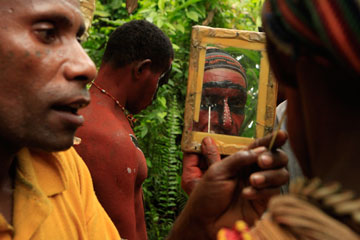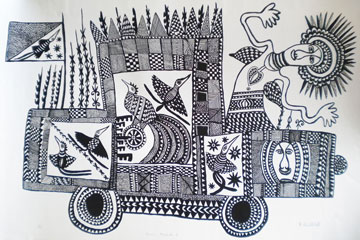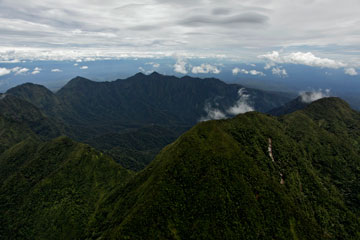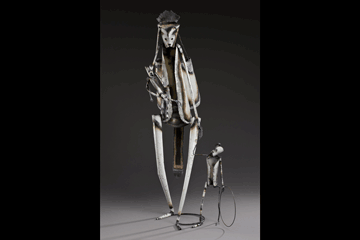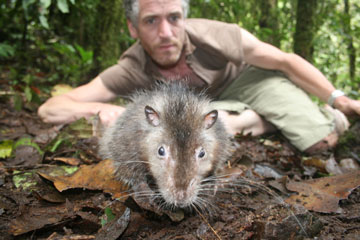![]()
Part of the ESfO 2010 conference at the University of St Andrews
Conveying the realities of Pacific people's lives,
and of anthropological research
Free events for the public - all welcome!
Pacific Connections is a series of free and publically accessible events aiming to provide engaging insights into the realities of Pacific people's lives, and into the realities of anthropological research.
Programme
| Date | Venue | Event |
|---|---|---|
| July 3rd - August 14th, 9 - 5.30pm | Gateway Galleries | Double Visions - Contemporary Art from Papua New Guinea |
| July 5th - 9th | St Salvator's cloisters | Key figures in Pacific Anthropology - Poster display |
| July 6th, 1 - 2pm | Gateway Galleries | Sharing and Appreciating Traditional Knowledge in Papua New Guinea: A Collaboration between Divine Word University, PNG & Heidelberg University, Germany |
| July 6th, 7 - 9pm | St Salvator's Quad | Avatar: Creating the Na'vi & Exploring the Resource Wars on planet Earth |
| July 7th, 1 - 2pm | Gateway Galleries | Coming Home to Banaba |
| July 7th, 10.30am - 1pm & 2 - 4.30pm | Buchanan Lecture Theatre, Union Street | Exchanging knowledge through Museums: Melanesian contexts |
| July 7th, 7 - 9pm | St Salvator's Quad | Lost Land of the Volcano: Conserving Diversity in Papua New Guinea's Rainforests |
| July 8th, 4.30 - 6.30pm | Gateway Galleries | Origins of Contemporary Art in Papua New Guinea |
Double Visions - Contemporary Art from Papua New Guinea
Dates: Saturday July 3rd - Saturday August 14th
Times: Mon-Fri 9-5.30 & Sat 10-5
Venue: Gateway Galleries, North Haugh
A rare Scottish opportunity to see work by contemporary artists from Papua New Guinea. A special feature of the exhibition will be paintings by the major artist Mathias Kauage OBE (1944-2003) who once visited Scotland and met the Queen. Also exhibited will be delicate figurative sculptures from recycled metal by Tom Deko; oils on canvas by Martin Morububuna; Sepik river carvings by Teddy Balangu, Lucas Tangun and Kaua Gita; and a range of textiles based on the traditional 'bilum' woven bag technique, featuring Cathy Kata.
'Double Visions: Contemporary Art from Papua New Guinea' is presented by FCA&C in collaboration with the Rebecca Hossack Art Gallery, London. The 'Hailans to Ailans' section was originally organised with the Alcheringa Gallery, Victoria, Canada.
Three Public talks accompanying the Double Visions exhibition:
Sharing and Appreciating Traditional Knowledge in Papua New Guinea: A Collaboration between Divine Word University, PNG & Heidelberg University, Germany
Dates: Tuesday July 6th
Times: 1 - 2pm
Venue: Gateway Galleries, North Haugh
A unique and innovative collaboration has been established between a European and Papua New Guinean university - to teach anthropology in PNG and to enrich teaching in Germany. This academic exchange program aims to create awareness of the richness of indigenous knowledge systems in the Pacific through teaching and learning, research and documentation. Furthermore, anthropology trains and empowers people to appreciate and pass on this knowledge in a rapidly changing world. It seeks to identify similarities that can be used for nation-building and develop an appreciation for the many distinct cultures and languages which should lead to intercultural competence and sensitivity towards alternative worldviews. This may well be a glimpse at what university activities will look like in the future.
Speakers:
- Professor Verena Keck (Heidelberg University)
- Dr Anastasia Sai (Divine Word University, Papua New Guinea)
Coming Home to Banaba
Dates: Wednesday 7th July
Times: 1 - 2pm
Venue: Gateway Galleries, North Haugh
Dr Grant McCall will be showing a short film - Coming Home to Banaba - about the people of Banaba (Ocean) Island, removed from their land after extensive phosphate development, and forcibly relocated to Rabi Island, in the Fiji group. Today, the Banabans of Rabi island enjoy a special status within the Fiji state, but many still long for their destroyed and lost home in the Central Pacific. In this documentary, a mixed group of Banaban Islanders and Europeans who were employed by the British Phosphate Corporation charter a boat to return to look at the place where they once lived. The film traces the history of the phosphate exploitation, including when the Banabans took legal action against the British Crown, resulting in the longest trial in British legal history.
Following the film, the audience will be asked to consider who has the native right on Rabi Island today? The original Rabians were removed from their island in the 19th century by a Fijian chief after a fierce battle and they remain today without rights on nearby Taveuni Island. The High Chief of Taveuni maintains his authority and control over the conquered Rabians. Whose rights should prevail?
Speaker:
- Dr Grant McCall is a social anthropologist from the University of New South Wales who studies the peoples and cultures of the Pacific Islands, most especially those of Eastern Polynesia from Mangaia, in the Cooks group, to Rapanui (Easter Island).
Origins of Contemporary Art in Papua New Guinea
Dates: Thursday 8th July
Times: 4.30 - 6.30pm, with wine reception from 5.30pm
Venue: Gateway Galleries, North Haugh
Fife Contemporary Art & Crafts’ organised exhibition ‘Double Visions - Contemporary Art from Papua New Guinea’ will be on show at the Gateway Galleries, University of St Andrews for the duration of the conference. Two talks have been arranged to accompany the exhibition.
Speakers:
- Mr Tom Craig is a Scottish artist who lived in PNG for 20 years where he was the first Director of the National Art School and involved in a range of cultural initiatives around the time of independence in 1975. He will be talking on the theme of ‘Origins of Contemporary art in Papua New Guinea’
- Dr Andrew Moutu (University of Adelaide), a Papua New Guinean anthropologist and one time curator at the PNG National Museum and Art Gallery, and will discuss the wider contexts in which contemporary art is inspired and produced in Papua New Guinea.
Key figures in Pacific Anthropology
Dates: Monday 5th - Friday 9th July
Times: open all day
Venue: St Salvator's Chapel cloisters
The Pacific has been a focus of study for anthropologists from many countries, both within and outside the region. Alongside the key figures, other posters will show on-going research projects in the region, including the University of St Andrews Centre for Pacific Studies.
Avatar: Creating the Na'vi & Exploring the Resource Wars on planet Earth
Date: Tuesday 6th July
Time: 7-9 pm
Venue: School 3, St Salvator's Quad, University of St Andrews - follow the signs!
James Cameron's spectacular science fiction film Avatar brought the planet Pandora vividly to life in 3-D. An indigenous people-like tribe of Na'vi are threatened by a mining corporation seeking to exploit a large deposit of 'unobtanium' located on Na'vi land. A new language, culture and cosmology was invented for Na'vi - in consultation with anthropologist Nancy Lutkehaus - and the film portrays many aspects of their social and spiritual life and their interconnections with the fantastic creatures, landscapes and mystical powers of Pandora. What was involved in creating the Na'vi?
Avatar has also brought to life concerns over the nature of contemporary encounters between indigenous peoples and resource extraction on planet Earth. Indigenous people who have seen Avatar have identified with the Na'vi - and recognized aspects of their own encounters with the mining, oil, gas and forestry industries. Campaign bodies such as Survival International have likened the story of Avatar to the plight of the Dongria Kondh people in India - who face British mining company Vedanta's plan to mine their sacred mountain for aluminium.
Often taking place on remote and rugged frontiers, these encounters have been called the 'resource wars' - bringing the different interests of local peoples, governments and corporations into complex confrontations. Pandora may be a distant, fictional planet - and yet, through the metal components in our computers and mobile phones, we are all connected to the resource wars on planet Earth. How best to balance the demand for resources, social responsibilities, and the rights of indigenous peoples whose story is similar to the Na'vi?
Speakers:
- Professor Nancy Lutkehaus, anthropological consultant on Avatar, will talk about her role in the conception of the Na'vi, and her role in making the film.
- Hon. Boka Kondra MP, leads a campaign against the impact of mining in Papua New Guinea, and has proposed radical changes to recognize indigenous ownership of mineral resources.
- Dr Andrew Moutu, an anthropologist from Papua New Guinea, has campaigned against the development of the new Freida River mine whose mine wastes may threaten those people living down river.
- Dr Tony Crook has conducted research in Papua New Guinea, and teaches a course entitled 'Anthropology, Indigenous People and Resource Extraction' at the University of St Andrews.
Exchanging knowledge through Museums: Melanesian contexts
Date: Wednesday 7th July
Time: 10.30am-1pm & 2pm-4.30pm
Venue: Buchanan Lecture Theatre, Union Street, St Andrews
A publically accessible working session of the ESfO 2010 conference designed to give an insight into Melanesian art, the role of Museums and into the life of academics.
Museums are a key location for indigenous communities in their engagement with Anthropology. Engagement around the concrete cultural product of objects enables ‘source communities’ to assert their own knowledge and contest perspectives on their knowledge and practice proposed by anthropologists, curators and others. At the same time, museum administrations, often acting for national governments, are increasingly under pressure to ensure source community participation in the management, research and exhibition of object collections. How effective or useful are these programmes and to whom?
Many museum related projects assume continuities between indigenous peoples and the objects housed/stored in the collections, and assume a moral prescription that indigenous people should participate in the representation of their cultural heritage. What are the politics of such assumptions and how do they affect the exchange of knowledge around objects? What are the goals of source communities and the goals of research and are they reconcilable? What are the implications for museums, those applying to research councils and funding bodies, and to indigenous people themselves when such continuities do not exist? What kind of real partnerships, exchanging knowledge, can be established between museums and source communities?
Drawing on the experience of the British Museum’s Melanesian Art Project, this session looks at aspects of the engagement between museums and source communities. Speakers will include a number of cultural specialists from Melanesia who have participated in the project.
All the speakers, including many from the Pacific, are closely involved in British Museum’s Melanesian Art Project.
Lost Land of the Volcano: Conserving Diversity in Papua New Guinea's Rainforests
Date: Wednesday 7th July
Time: 7-9 pm
Venue: School 3, St Salvator's Quad, University of St Andrews - follow the signs!
Meet the BBC programme makers of Lost Land of the Volcano which revealed the rich biodiversity of Mt Bosavi in Papua New Guinea - and discovered many species new to science, including the famous Giant Rat. Meet the anthropologists who have conducted fieldwork with the local Papua New Guinean peoples - and hear about Mt Bosavi's cultural diversity and how the volcano's birds and animals are seen as part of their rainforest life-world. And meet a Papua New Guinean with experience of the wider pressures and protection efforts to conserve the diversity of these spectacular, but threatened, rainforests.
Two of the Lost Land of the Volcano's makers - BBC Producer Steve Greenwood and bat-expert Alanna Maltby - will show clips of the documentary and talk about their experiences in Papua New Guinea. Augustine Rapa is a Papua New Guinean with insights into his country's conservation issues, and is presently studying in the UK. Two anthropologists - Buck Schieffelin and Florence Brunois - will talk about their long-term research and describe the local cosmologies of the rainforest.
This free event aims to make accessible to the public the role of scientific and indigenous knowledge in the efforts to conserve the diversity of life in Papua New Guinea's rainforests. This will be a chance to hear about making Lost Land of the Volcano, and to discuss the potential of TV documentaries to further influence conservation in the future. Come and discover life in Papua New Guinea's rainforests from those who have lived and worked there!
Speakers:
- Mr Steve Greenwood, trained as a biologist and has been a documentary maker with the BBC for 18 years, based now in the Natural History Unit in Bristol. BBC Series Producer and team leader for Lost Land of the Volcano.
- Ms Alanna Maltby is a zoologist at University College London studying the evolution of echolocation in bats worldwide. Her fieldwork has seen her catching bats on five continents, with a focus on South East Asia, and last year in Papua New Guinea when featuring in Lost Land of the Volcano.
- Professor Buck Shieffelin, anthropologist from University College London, with research experience around the volcano, Mt. Bosavi, in Papua New Guinea.
- Dr Florence Brunois, anthropologist from Collège de France, Paris, has lived and conducted research with the Kasua people who appeared in Lost Land of the Volcano.
- Mr Augustine Rapa, a Papua New Guinean doctoral researcher from the University of East Anglia, is working on the wider contexts of conservation in PNG.

